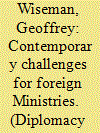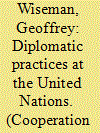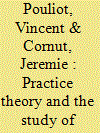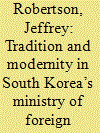|
|
|
Sort Order |
|
|
|
Items / Page
|
|
|
|
|
|
|
| Srl | Item |
| 1 |
ID:
170930


|
|
|
|
|
| Summary/Abstract |
Whilst the diplomatic studies field has grown impressively in the past decade, paradoxically there is much still to be learnt about ‘state foreign services’, a term covering the two sides of the diplomacy coin: diplomats serving at home – in the Foreign Ministry – and abroad – at embassies and consulates. Diplomats have a Janus-faced view of their profession: as envoys abroad and bureaucrats at home. This analysis first assesses the American approach to diplomacy’s two sides, focusing on the impact of the Donald Trump presidency as a benchmark. Flowing from this are several key challenges that bedevil virtually all democratic foreign ministries: How to frame the ‘national interest’? How to represent blemished or populist leaders? How to deal with dissent? How to balance the field-headquarters nexus? And how to manage relations with non-state actors. So long as the Westphalian state system survives, so, too, will the two-sided foreign-service model. Only when moving away from diplomacy as ‘state practice’ to diplomacy as ‘social practice’ can the foreign-service model recede, with diplomacy becoming disintermediated, omnilateral, and post-Westphalian, potentially manifesting radically different practices.
|
|
|
|
|
|
|
|
|
|
|
|
|
|
|
|
| 2 |
ID:
141722


|
|
|
|
|
| Summary/Abstract |
This article considers the importance of informal, practice-based change as opposed to formal change at the UN. I first evaluate UN reform, showing that diplomacy and institutional change within the UN system are better understood as having evolved less from major, formal reform of the UN Charter (‘the Charter’) than from minor changes in routine practices. I then examine what practice theory and diplomatic studies can learn from each other in terms of how each views the role of leading individuals, illustrating specific practice-based change in relation to the Secretary-General’s role. Next, I show how the appointment process for a new Secretary-General has evolved through informal practice, after which I advance an argument that UN diplomatic practices should be considered not only within the narrow context of a formal diplomatic corps of member state diplomats but also as part of an informal, wider diplomatic community of diplomats and non-state actors. Practice theory helps students of diplomacy think more abstractly and systematically about mundane diplomatic practices. Students of diplomacy can help guide practice theory toward empirical diplomatic activities that are often internalized and taken for granted. I conclude that a dialog between the two fields will promote a better understanding of diplomacy as undervalued practices.
|
|
|
|
|
|
|
|
|
|
|
|
|
|
|
|
| 3 |
ID:
141721


|
|
|
|
|
| Summary/Abstract |
This introductory article explores the multiple synergies between international practice theory and diplomatic studies. The timing for this cross-fertilizing exchange could not be better, as the study of diplomacy enters a phase of theorization while practice scholars look to confront the approach to new empirical and analytical challenges. The article first defines diplomacy as a historically and culturally contingent bundle of practices that are analytically alike in their claim to represent a given polity to the outside world. Then the key analytical wagers that practice theory makes are introduced, and debates currently raging in the discipline are briefly reviewed. Next, it is suggested what a practice theory of diplomacy may look like, discussing a variety of existing works through their common objective to explain the constitution of world politics in and through practice. Finally, a few research avenues to foster the dialogue between diplomatic studies and practice theory are outlined, centered on the nexuses of transformation and reproduction, rationality and know-how, and the technical vs. social dimensions of practices –diplomatic or otherwise.
|
|
|
|
|
|
|
|
|
|
|
|
|
|
|
|
| 4 |
ID:
170932


|
|
|
|
|
| Summary/Abstract |
South Korea’s diplomatic practice was traditionally marked by a distinct lack of transparency. The early struggle for political legitimacy as one-half of a divided nation and ongoing security threats placed a high premium on secrecy. Even today, diplomatic studies remains an undeveloped field. Despite the establishment of the Korea National Diplomatic Academy (KNDA) and the opening of a Centre for Diplomatic History, the amount of scholarship on the foreign ministry itself and its diplomats remains remarkably low. However, South Korea is a society undergoing momentous societal transformation. What commenced with economic development in the 1980s, and continued with political development in the 1990s evolved into societal development in the 2000s. The Ministry of Foreign Affairs (MOFA) has not been immune to these changes. MOFA is undergoing democratization and becoming more representative of broader South Korean society. It is being called on more often to serve the Korean public and to be more accountable for its actions. Finally, there is growing public recognition of the important role that the foreign ministry plays in securing South Korea’s political, economic, and security interests. This article looks at the underlying conditions which suggest the time is ripe for a practice turn in South Korean international relations, and a turn to diplomatic studies. The article highlights important research questions on the foreign ministry, which could contribute to the broader field of diplomatic studies, and justifySouth Korea as an ideal case study to highlight the benefits of studying states’ foreign services.
|
|
|
|
|
|
|
|
|
|
|
|
|
|
|
|
|
|
|
|
|